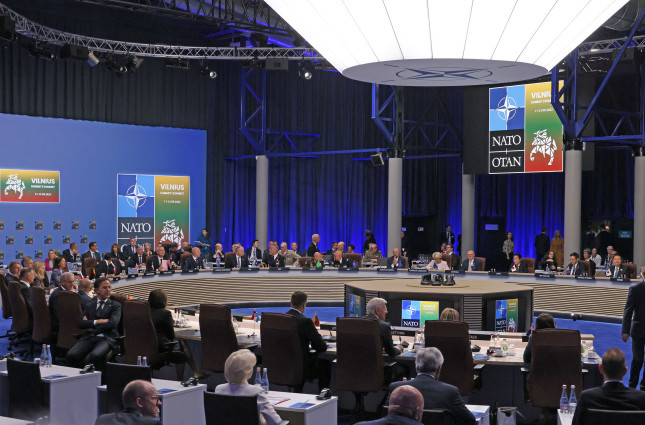-
The Climate Security Nexus: A Transatlantic Conversation With NATO
July 21, 2023 By Claire Doyle
From individual health risks to geopolitical tensions, climate impacts are relevant to every facet of peace and security. Focus on these links has sharpened in recent years, as governments and international security organizations like NATO increasingly recognize that climate responses must be part of promoting peace and security.
In June, the German Marshall Fund of the United States convened a high-level transatlantic conversation that shed further light on how NATO, the US, and the EU grapple with climate security. The participants included US Special Presidential Envoy for Climate John Kerry, NATO Secretary Jens Stoltenberg, Josep Borrell, High Representative of the European Union for Foreign Policy and Security Policy, and European Commission Executive Vice President Frans Timmerman—who is tasked with leading the commission’s work on the European Green Deal.
“This is a historic moment when we have the representatives of four different institutions taking climate security very seriously in the middle of a hot war in Europe,” said Heather Grabbe, Senior Advisor of the Open Society Foundations, who moderated the event.
Defining “Security” – and How Climate Fits In
In the past, “security” has often been narrowly associated with war, conflict, and stability. But Kerry observed that “security is everything. Your health security, energy security, food security, political and social structural security.”
Because climate change touches all parts of life, from food availability to economic prosperity, its impact on security is far-reaching. “You don’t have security, not any kind of security whatsoever, unless you deal with the climate crisis,” said Kerry.
Speakers at the event illustrated how climate change contributes to greater competition over scarce resources, geostrategic risks, livelihood degradation, and massive public health crises, among other threats. Kerry specifically cited a WHO finding that air pollution causes roughly 8 million deaths every year.
These impacts also create migratory pressures, especially when people can no longer live healthily or maintain their livelihoods. “If you have a global south that cannot live where they work and cannot work where they live [people will] find another place,” said Kerry.
Timmermans offered that in Africa, for instance, climate extremes could mean more people on the move: “The fact that parts of Africa risk becoming unlivable because of high temperatures has a huge impact on migration flows.”
Northern Russia poses a different challenge, said Timmermans. In that region, a warming climate is leading to the disappearance of permafrost—and the opening of shipping lanes will trigger a new set of geostrategic choices.
Borrell agreed that the warming Arctic is quickly becoming a geopolitical frontier. He warned that “new resources—oil, gas, coal, minerals and land and new shipping routes” in the region will heighten competition and security concerns.
Where Security Actors Can Contribute to Climate Action
While climate change poses a risk for security, the inverse is also true: Insecurity and a lack of cooperation can complicate climate action. “If we have conflicts between big powers and less stability and security,” said Stoltenberg, “then of course we are less able to make agreements like the Paris Accord.”
There was general consensus among the panelists that engaging with China is crucial if we want to meet climate goals. China accounts for 30% of global emissions, and currently deploys more renewable energy than all NATO allies combined.
But security actors must also turn the lens around and reduce their own carbon footprint, observed both Stoltenberg and Borrell. The world’s militaries are major emitters — In 2022, military organizations’ combined emissions accounted for a whopping 5.5% of global greenhouse gas emissions.
Stoltenberg said that NATO is working to cut its own emissions from military activities. But in order for militaries to adopt less carbon-intensive practices, the available alternatives must be just as effective. (NATO’s mandate explicitly states that operational imperatives take precedence over Environmental Protection principles and policies).
A Roadmap for a Secure, Green Future
In light of the challenges posed by climate security dynamics, the speakers at the event articulated how the energy transition offers the promise of a more secure, livable, and prosperous future.
“There are a lot of opportunities in building all this infrastructure, in building power plants which are green and climate-friendly,” said Stoltenberg. “This is a new source of modern jobs for a lot of people.” Yet he also observed that any transition must not inadvertently create new vulnerabilities, such as an overreliance on China for rare earth minerals.
And as those working in the security space ramp up their climate-related initiatives, connections between these key sectors should be strengthened. “If you look back at the last 100 years, there’s always been an intimate relationship between security and technological developments,” said Timmermans. “What we need now is an intimate relationship between security and science on climate.”
In that vein, the same urgency afforded to security-related technologies should be applied to deploying climate responses. Borrell proposed that adaptation finance efforts, for instance, should be considered as urgent as the effort to produce “Liberty ships” during the Second World War.
Kerry said that the work to make essential and much needed changes will pay off: “We need to be smarter, more engaged, take action, and embrace this incredible cleaner, safer, healthier set of possibilities that are waiting on the other side of this transition.”
Sources: NATO, Reuters.
Photo Credit: Fumio Kishida at the 2023 NATO summit in Vilnius, from the Government of Japan, Wikimedia Commons, CC BY 4.0.
.
 A Publication of the Stimson Center.
A Publication of the Stimson Center.



